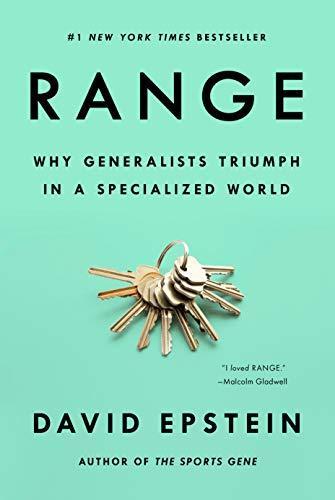Review of 'Range: Why Generalists Triumph in a Specialized World' on 'Goodreads'
3 stars
It was fine but also a bit boringly written.

352 pages
English language
Published Nov. 6, 2019
Range: Why Generalists Triumph in a Specialized World is a 2019 book by David Epstein in which he expands on the points from his previous book The Sports Gene: Inside the Science of Extraordinary Athletic Performance to make a more general argument against overspecialization. In the book, he argues that range – defined as more diverse experience across multiple fields – is more relevant in today's society than specialization because the wicked problems of the modern world require bridging experience and knowledge from multiple fields to foster solutions.
Range: Why Generalists Triumph in a Specialized World is a 2019 book by David Epstein in which he expands on the points from his previous book The Sports Gene: Inside the Science of Extraordinary Athletic Performance to make a more general argument against overspecialization. In the book, he argues that range – defined as more diverse experience across multiple fields – is more relevant in today's society than specialization because the wicked problems of the modern world require bridging experience and knowledge from multiple fields to foster solutions.
It was fine but also a bit boringly written.
I loved this book. Even though I am not a particular fan of 'big idea' books, Range had me hooked from beginning to end. The reason for this is that it honestly goes beyond the surface idea of generalists being useful and attempts to figure out why generalism works, how you could train people to become generalists and how you can get generalists to shine in an organization. This is done in true interdisciplinary fashion: by jumping across fields and connecting the dots between psychology, cognitive science, organizational science and economics.
This book comes as a strong recommendation to generalists worldwide (even the closeted types), those who happen to work in interdisciplinary education, those who believe that education should be about recipes, flowcharts and checklists (boo) and those who are doing or thinking something else entirely, because you never know what may happen if you play around with a new …
I loved this book. Even though I am not a particular fan of 'big idea' books, Range had me hooked from beginning to end. The reason for this is that it honestly goes beyond the surface idea of generalists being useful and attempts to figure out why generalism works, how you could train people to become generalists and how you can get generalists to shine in an organization. This is done in true interdisciplinary fashion: by jumping across fields and connecting the dots between psychology, cognitive science, organizational science and economics.
This book comes as a strong recommendation to generalists worldwide (even the closeted types), those who happen to work in interdisciplinary education, those who believe that education should be about recipes, flowcharts and checklists (boo) and those who are doing or thinking something else entirely, because you never know what may happen if you play around with a new idea.
